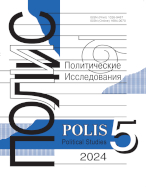Institutional Mechanisms of Autocracy Maintenance:
the Case of the Genoese Republic on the Threshold of New Time
DOI: 10.17976/jpps/2006.03.04
Makarenko S.A. Institutional Mechanisms of Autocracy Maintenance: the Case of the Genoese Republic on the Threshold of New Time . – Polis. Political Studies. 2006. No. 3. https://doi.org/10.17976/jpps/2006.03.04
Applying a concrete historical example, the article retraces the working of one of institutional mechanisms making for the conservation of autocratic ways. On analyzing in detail the evolution of the Genoese Republic’s socio-political structure in the 11th to the 16th centuries, the author demonstrates that stability of autocratic regimes with a closed political class depends straight on their ability of creating mechanisms of integrating the most active members of alternative hierarchies. In case such mechanisms are available, autocratic regimes acquire firmness and steadiness and for their democratization, pressure from outside is required. According to the author’s conclusion, democratization of such regimes from inside is possible only in cases if the channels of absorption of the members of alternative hierarchies become “clogged”, when the ruling elite, failing to cope with growing social tension, finds itself compelled to make concessions.
See also:
Lukin A.V.,
The Transition Period in Russia: Democratization and Liberal Reforms. – Polis. Political Studies. 1999. No2
Oleskin A.V.,
Network Structures of Society from the Viewpoint of Biopolitics. – Polis. Political Studies. 1998. No1
Vorobyov D.M.,
Bearer of Legitimacy (Russian Political Tradition of Organization of the Power’s Social Address). – Polis. Political Studies. 2003. No5
Kulpin E.S.,
How to Transform Ourselves?. – Polis. Political Studies. 1991. No4
Sokolskaya I.B.,
Is the Conservative Revolution Conservative? (On a Chronological Scale of Political Theories). – Polis. Political Studies. 1999. No6





.jpg)






 print
print
.jpg)
.jpg)